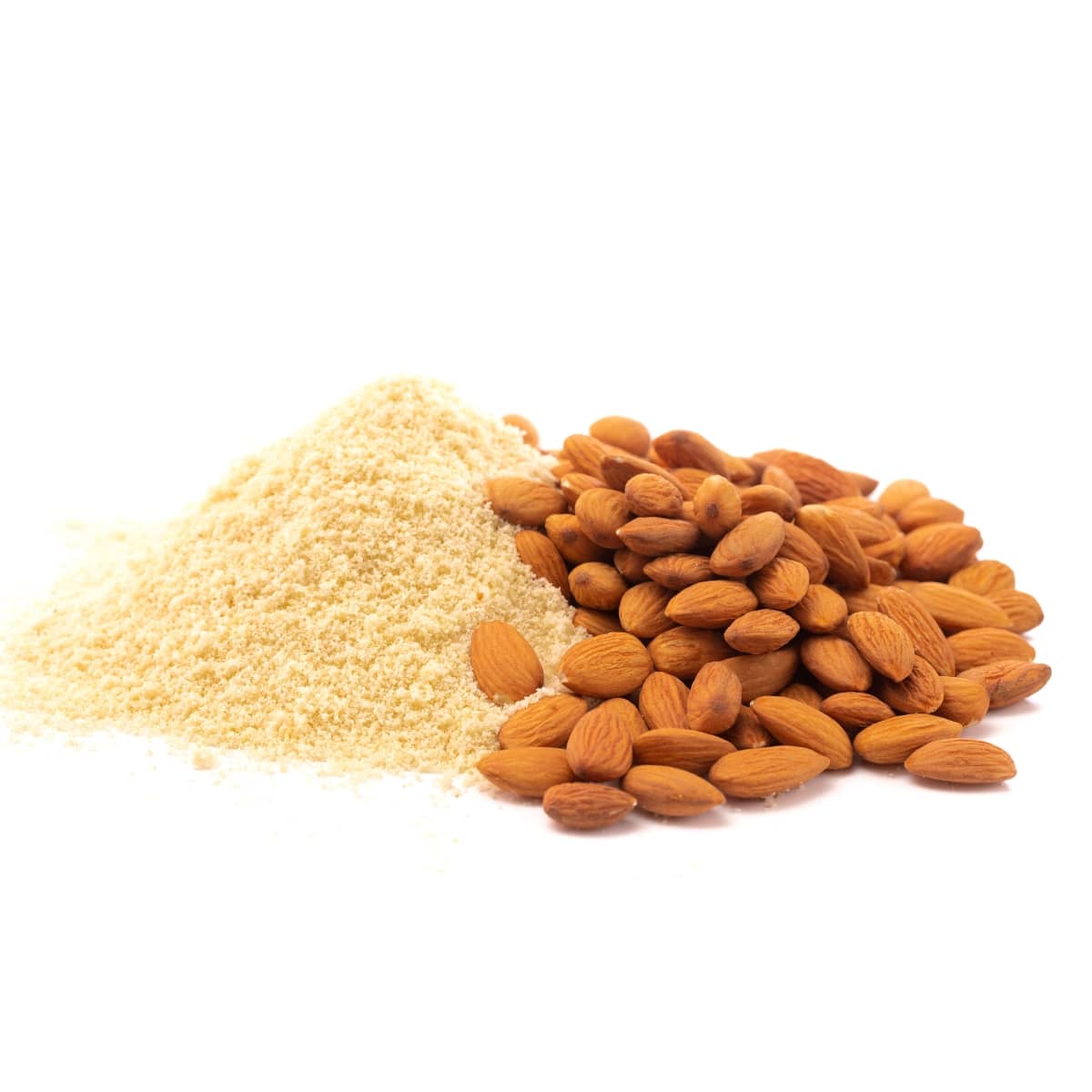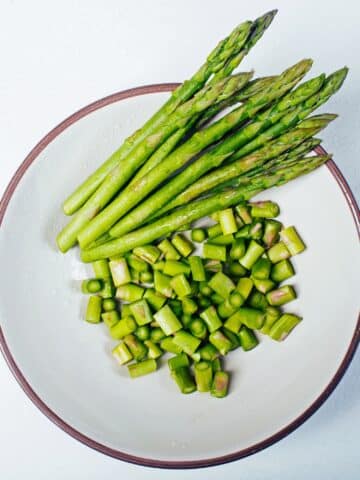Nut Flours For Chronic Kidney Disease Patients
Nut flours are a versatile alternative to wheat flour that offers numerous health benefits for individuals with chronic kidney disease (CKD) to maintain kidney health. High in protein and rich in flavor, these flours can be used in a variety of recipes to add both nutrition and taste.
With some creativity and knowledge, incorporating nut flours for kidney disease into your diet can provide an enjoyable and kidney-friendly eating experience. So, let's dive into the benefits of nut flours for those with chronic kidney disease and explore how to easily substitute them into a renal diet.
Jump to:
What Are Nut Flours?
Nut flours are a great alternative for people with kidney disease who want to decrease the risk of developing heart disease or need to have a low sodium renal diet due to other medical reasons.
People with kidney disease can use nut flours in baking recipes as a substitute for all-purpose flour, but should be mindful of the amount used due to their perishable nature.
Moreover, some types have higher levels of potassium and phosphorus content than others, so this should be looked out for as well.
As a refresher, a kidney-friendly diet for people with kidney disease requires limiting sodium intake, avoiding high potassium foods, restricting phosphorus intake, meeting your daily protein requirements, and managing fluids.
Strictly adhering to a diet for kidney disease is beneficial in reducing kidney damage, keeping blood pressure normal, and preventing further complications such as damage to blood vessels.

Nutritional Differences vs All Purpose Flour
When it comes to using alternative flours, it's important to consider the comparative analysis of nutritional differences between all purpose flour and its substitutes.
Nut flours are known for their nutrient density, lower glycemic index, higher protein content, and improved digestibility compared to wheat flour. These qualities make nut flours a great option for renal patients who need to watch their nutrient intake.
Nutritional analysis shows that almond flour has more protein than wheat flour, making it an excellent source of plant-based protein. If you have a sweet tooth and want to try almond flour out, then give these kidney friendly almond cookies a try!
- Pecan flour is also high in fiber content which can help maintain healthy digestion.
- Hazelnut flour is rich in magnesium which is essential for maintaining strong bones.
- Chestnut flour has a low glycemic index which helps regulate blood sugar levels and prevents energy crashes throughout the day.
By incorporating nut flours into your diet as an alternative to all-purpose flour, you can enjoy delicious baked goods while reaping the benefits of a more nutritious ingredient. Check out these kidney-friendly desserts!
For More Recipes and Ideas --->> Get Your Free Meals and Recipes That Are Perfect for Pre-Dialysis Diets, Pre-Dialysis with Diabetes, or Dialysis Diets.

How CKD Patients Can Use Them
If you're looking to add a nutritious twist to your traditional baking, alternative flour options like nut flours can be a great substitute for those watching their nutrient intake.
However, for renal patients who need to limit their phosphorus and potassium intake, nut flours typically contain higher amounts of these minerals, so consultation with your renal dietitian is needed.
For those looking for gluten-free products, instead of using regular white flour in pancakes, try adding some almond or coconut flour for extra protein. These breakfast for ckd stage 3 options are great!
For those looking to add extra fiber in their renal diet, you can also use kidney-friendly ingredients such as whole-grain breads made from nut flours as a base for sandwiches or toast.
Nut flours are not just limited to sweet treats; they can also be used in savory dishes like meatballs or crumble toppings. Using nut flour instead of breadcrumbs in meatballs will give them an added boost of protein and flavor. Say hello to this vegetarian breakfast option!
Nut flour crumble toppings are perfect for adding texture and richness to casseroles or roasted mixed vegetables. With its versatile nature, incorporating nut flours into your cooking is an easy way to make your meals more nutritious while still being delicious.
Health Benefits
Nut flours offer many health benefits that make them a great option for kidney patients. Here are some reasons why you should consider incorporating nut flours into your diet:
- High in protein: Nut flours are a rich source of plant-based protein, making them perfect for those with kidney disease who need to limit their animal protein intake, or those who need to be on a high protein diet (such as people with kidney disease on dialysis).
- Low in carbohydrates: Compared to wheat flour used in traditional baking, nut flours have fewer carbs and can help regulate blood sugar levels.
- Heart-healthy fats: Nuts contain healthy fats like monounsaturated and polyunsaturated fats, which can protect against heart disease.
When cooking with nut flours for kidney disease, it's essential to keep in mind some tips and potential drawbacks. Because they have no gluten which provides structure in baking, the end product will be denser and crumbly than traditional whole wheat flour products. Because of the high oil content in nuts, nut flour can become rancid quickly if not stored correctly.
To incorporate more nut flour into your kidney failure diet, try using almond or hazelnut flour when baking bread or muffins. You could also use pecan or walnut flour as a substitute for breadcrumbs on meat dishes like chicken fingers or fish sticks. Finally, coconut flour is an excellent option for making gluten-free pancakes or waffles.
Sourcing information about where to buy quality nut flours is important since not all brands are created equal. Look for organic options that don't include any additives or preservatives and come from reputable sources.
With its many health benefits and countless recipe ideas available online, incorporating nut flours into your kidney diet plan is an easy way to boost nutrition while still enjoying delicious baked goods!
Substituting Nut Flours
You can easily make your baked goods healthier and more flavorful by swapping out traditional wheat flour for nut flours, giving you a guilt-free treat that will leave your taste buds satisfied.
However, it's important to keep in mind that nut flours are not a one-to-one swap for wheat flour. You'll need to adjust baking techniques and recipe adaptations to ensure the best results.
When substituting nut flours, consider flavor combinations and texture considerations. Each type of nut flour has its own unique flavor profile and works better in certain baked goods than others.
For example, almond flour has a rich, nutty flavor that works well in pancakes, breads, meatballs, burgers, and as a breading for chicken or fish. Pecan flour has a maple flavor that is ideal for muffins, cookies, and streusel toppings.
If you're new to using nut flours in your baking or want to experiment with different blends of flours, try using pre-made blends available at health food stores or online retailers. Nut flour blends combine different types of nuts for optimal nutrition and flavor profiles for people with kidney failure.

Types of Nut Flours
- Starting with almond flour, you'll find that a ¼ cup serving contains about 6g of protein and 3g of fiber, making it a great choice for those with chronic kidney disease.
- Tiger nut flour, which is actually made from a tuber rather than a nut, is rich in fiber and iron and has a slightly sweet taste that works well in baked goods.
- Cashew flour is another option to consider, as it's high in protein and healthy fats while also being relatively low in carbohydrates.
- Walnut flour is also worth exploring due to its high levels of omega-3 fatty acids and antioxidants.
Finally, don't forget about other types of nut flours like hazelnut, pecan, or pistachio which can all add unique flavors and nutritional benefits to your recipes.
| Flour Type | Weight (g) | Calories | Protein (g) | Carbohydrates (g) | Fat (g) | Sodium (mg) | Potassium (mg) | Phosphorus (mg) |
| Almond Flour | 28 | 163 | 6.1 | 6.7 | 14.2 | 0.2 | 170 | 124 |
| Tiger Nut Flour | 28 | 147 | 3.1 | 23.9 | 5.8 | 1.1 | 80 | 60 |
| Cashew Flour | 28 | 157 | 4.3 | 11.5 | 10.3 | 0.7 | 150 | 160 |
| Walnut Flour | 28 | 173 | 4.3 | 4.7 | 16.5 | 0.2 | 120 | 110 |
| Pecan Flour | 28 | 172 | 3.3 | 3.6 | 17.5 | 0.2 | 120 | 132 |
| Hazelnut Flour | 28 | 181 | 4.3 | 5.3 | 16.8 | 0.2 | 100 | 140 |
Almond Flour Nutritional Information
A 28-gram serving of almond flour contains 6 grams of protein and only 2 grams of net carbs. This makes it an ideal ingredient for gluten-free diet, healthy recipes, low-carb diets, and diabetic-friendly desserts (kidney friendly diet for diabetics). Intake of almond flour is a sure nutrition boost as it is rich in vitamin E, magnesium, and fiber.
Almond flour is a nutritious alternative to wheat flour that can be used in various baked goods such as cakes, cookies, breads, and muffins. It has a slightly nutty flavor that compliments both sweet and savory dishes. Plus, it adds moisture and richness to baked goods without adding unhealthy fats or sugars.
However, almond flour is relatively high in terms of potassium content and amounts of phosphorus, so it is best to consume it in small amounts. Remember, moderation is key in keeping up with the dietary restrictions of a kidney-friendly diet.
Tiger Flour Nutritional Information
Tiger flour is a type of nut flour made from ground tiger nuts, which are actually tubers and not nuts at all. Here are some things you should know about Tiger Flour:
- Uses: Tiger Flour is versatile and can be used in both sweet and savory dishes. It adds a naturally sweet nutty flavor to baked goods like muffins, cakes, and cookies.
- Benefits: Tiger Flour is high in nutrients like fiber, iron, magnesium, and vitamins E and C. However, it is also high in potassium. It has prebiotic properties that promote good gut health.
- Brands: Some popular brands of Tiger Flour include Organic Gemini Tigernut Flour and Anthony’s Goods Tigernut Flour.
For individuals with kidney disease who need to watch their protein intake (watch this podcast on: does the type of protein for CKD?). Tiger Flour can be a great alternative to traditional wheat flour. It has less protein than other nut flours like almond or coconut flour but still provides the same benefits with added prebiotic properties for gut health.
With its natural sweetness and versatility in recipes, it's worth giving Tiger Flour a try as a substitute for wheat-based flours in your baking needs.
Cashew Flour Nutritional Information
If you're looking for a new gluten-free flour to add to your baking repertoire, you should definitely try cashew flour. It's packed with nutrients and has a deliciously nutty flavor!
Cashews are a rich source of healthy fats, protein, and minerals like magnesium and copper. Using cashew flour in your baking can help boost the nutritional content of your baked goods.
Cashew flour can be used in a variety of recipes, from cakes and cookies to savory dishes like breaded chicken or fish. It adds a rich, nutty flavor that pairs well with sweet or savory ingredients.
However, it's important to note that cashew flour is more perishable than traditional wheat flour due to its higher fat content. To avoid spoilage, store it in an airtight container in the fridge or freezer.
Walnut Flour Nutritional Information
Walnut flour is a delicious and nutritious alternative to traditional wheat flour, offering a buttery flavor and high fat content that can add a unique touch to your baking.
In addition to being gluten-free, walnut flour also contains more Omega 3 fatty acids than any other nut flour, making it an excellent choice for those looking to boost their heart health. Its rich flavor pairs well with fall-inspired ingredients such as pumpkin, cinnamon, and apple. Use walnut flour in this kidney friendly pumpkin pie.
When using walnut flour in baking applications, keep in mind that it has a higher fat content than traditional wheat flour and may require adjustments in the recipe.
It's important to note that some individuals may have allergies or sensitivities to tree nuts like walnuts, so be sure to check with your healthcare provider such as your doctor or renal dietitian before incorporating this ingredient into your low sodium kidney diet plan.
Other Types Of Nut Flours
You can add variety and nutrition to your gluten-free diet by trying out different types of nut flours, each with its own unique flavor and potential health benefits.
Almond flour is a popular choice for its rich, nutty taste and versatility in pancakes, breads, meatballs, burgers, and breading for chicken or fish. Pecan flour offers a maple flavor that works well in muffins, cookies, and streusel toppings. Walnut flour is the most delicate of all nut flours and adds a bitter note to brownies or financiers.
Other types of nut flours include hazelnut flour with its buttery taste that compliments chocolate and figs; chestnut flour which pairs well with Christmassy flavors like apples, oranges, caramel, and chocolate.
Pistachio flour which has a rich savory taste that goes well with cardamom or raspberries; coconut flour which has a more tropical flavor than other nut flours.
You can experiment with these different options to find new baking combinations that suit your palate! Here are some meal-planning hacks that you can do:
- Swap out whole-wheat flour for flours with higher protein content
- Try using as breadcrumbs for meatballs or meatloaf paired with mixed vegetables
- Substitute half plain gluten-free blend with half nut flour in cakes
- Consider using a 7 day meal plan for kidney disease
Aside from nut flours, other types used as alternative flour include brown rice flour, white rice flour, chickpea flour, and yellow corn flour.
Nut Flours vs Wheat Flour
When you switch from wheat flour to nut flours, you may notice that your baked goods are denser and softer due to the absence of gluten, but they will also have a higher fat content which can contribute to a richer taste.
The lack of gluten in nut flours means that they won't produce baked goods with as much structure, chew or bounce, resulting in a tender and delicate texture. However, the high-fat content in nut flours produces an almost buttery end product because natural oils are released when baked.
To help you understand the differences between using wheat flour and nut flours in baking, here is a table outlining some key points:
| Wheat Flour | Nut Flours |
| Contains gluten | Gluten-free benefits |
| Creates a chewy and structured texture | Produces soft and tender texture |
| Available at most grocery stores | May require specialty stores or online purchases |
Despite having different textures than wheat flour, nut flours still have plenty of baking applications. Almond flour is perfect for pancakes, breads, meatballs, burgers and breading for chicken or fish. Pecan flour has a maple flavor ideal for muffins, cookies and streusel toppings.
Each type of nut flour will lend its own unique flavor profile to your baking creations making them distinct from traditional wheat-flour-based treats.
Gluten Free Substitutions
If you're looking to make a switch from wheat flour to nut flours in your baking, but are worried about the lack of gluten, don't worry - there are plenty of binder substitutions available that can help you achieve the perfect texture and structure.
Substitution options include eggs, egg substitutes, ground flax seeds, chia seeds, banana, maple syrup, brown rice syrup, applesauce, or oat flour. Wondering if you can eat eggs on a renal diet? Yes in all kinds of recipes. These binding agents work by holding the ingredients together in place of gluten.
When using these binding agents for recipe modification with nut flours, it's important to keep taste testing in mind. The amount of binder needed can vary depending on the recipe and desired outcome.
It's recommended to start with small amounts and gradually increase until the desired texture is achieved.
Storage Tips
To keep your nut flours fresh and flavorful, you should store them in a sealed bag or jar in the fridge or freezer, where they can remain cool and dry until the next time you need to add a rich, nutty taste to your baked goods.
Proper storage is essential for maintaining freshness and extending shelf life. Here are some preservation techniques that will help ensure your nut flours stay at their best:
- Keep them in an airtight container: This will prevent moisture from getting in and causing mold or spoilage.
- Label them with the date: Nut flours can lose flavor over time, so it's important to know how long they've been stored. Write the date on the container so you can use them before they expire. Nut flours should also be bought in small quantities due to their perishable nature.
- Store them away from strong odors: Nut flours absorb smells easily, so make sure they're not near anything with a strong scent like onions or garlic.
By following these tips, you'll be able to enjoy your nut flours for longer periods without worrying about spoilage or loss of flavor.
Whether you're using almond flour for pancakes or pecan flour for muffins, proper storage is key to ensuring delicious results every time. So, go ahead and stock up on your favorite nuts, just remember to store them properly! Always make sure you're paying attention to food safety for people with kidney disease.
Frequently Asked Questions About Nut Flours
Nut flours are versatile and flavorful alternatives that can be used in baking and savory cooking. They add a rich, nutty taste to baked goods, but it's important to note that they won't produce as much structure or chew due to the lack of gluten.
Nut flours are available in different varieties like almond, pecan, walnut, coconut, and hazelnut flour. They're also great substitutes for breadcrumbs in meatloaves or meatballs, can be added to pancakes for texture, and work well in crumble or streusel toppings.
However, if you have chronic kidney disease, it's best to check with your doctor before incorporating nut flour into your renal diet as some nuts may be restricted due to their phosphorus and potassium content. Grab a list of low phosphorus foods here.
Looking to add some nutty goodness to your savory dishes? Nut flours are a great way to boost the nutritional value and flavor of your cooking.
Try mixing almond flour or hazelnut flour with parmesan cheese as a coating for chicken or fish, or use pecan flour in place of breadcrumbs for meatballs.
Walnut flour pairs well with spices like cinnamon and cardamom in veggie burgers, while pistachio flour adds a pop of color and flavor to risottos or salad dressings. Give this quinoa salad a try!
Remember to store nut flours in an airtight container in the fridge or freezer to keep them fresh, and experiment with different recipe ideas and cooking techniques for delicious results!
When using nut flours in baking, there are a few precautions to keep in mind. First and foremost, be aware of any nut flour allergies among those who will be consuming the baked goods.
Make sure to follow proper baking safety protocols, including measuring ingredients accurately and adjusting oven temperatures if necessary. Renal diet meat portion control is also something to pay attention to!
When substituting nut flour for wheat flour, it's important to use the correct ratio of binder ingredients such as eggs or ground flax seeds.
Finally, due to their higher oil and fat content, nut flours should be stored in an airtight container in the fridge or freezer to prevent spoilage. By taking these precautions, you can safely enjoy the unique flavor and texture that nut flours bring to baked goods.
Nut flours can be a delicious and nutritious substitute for all-purpose flour in many recipes. Not only do they add rich, nutty flavor options, but they also offer high protein content and unique texture differences.
While the cost may be higher for some nut flours compared to all-purpose flour, the nutrition benefits make it worth it. Don't forget to use baking tips like binders and adjust oven temperatures accordingly when substituting with nut flours.
So, go ahead, experiment with almond, pecan or even coconut flour – you might just discover a new favorite ingredient!
Texture advantages, nutrient boost, flavor profile, and baking versatility are just some of the benefits of using nut flours in your gluten-free baking.
Not only do they add a rich, nutty taste to your baked goods, but they also provide a high-protein alternative to wheat flour. Plus, they're naturally free of certain allergens like wheat and dairy.
With so many different types of nut flours available - from almond to hazelnut to coconut - you can experiment with different flavors and textures until you find the perfect match for your recipe. So go ahead and take control of your gluten-free baking with nut flours!
In Moderation, Nut Flours Are OK in CKD
Nut flours offer health benefits for individuals with chronic kidney disease. Adding these versatile alternative flours to your kidney diet plan can provide you with high protein content and add a rich, nutty flavor to your meals. The benefits of a renal diet outweigh anything you may be missing out on!
Just be sure to use them correctly and in the guidance of healthcare professionals including your kidney dietitian so you can also take care of your phosphorus and potassium levels based on your dietary restrictions.
With so many types of nut flours available, there is no reason not to explore their potential and incorporate them into your cooking repertoire. Remember to store them properly in an airtight container in the refrigerator or freezer for optimal freshness. You can even use them to make renal diet freezer meals.
With these tips and knowledge in mind, you are ready to experiment with different types of nut flours and include them in your healthy diet!












